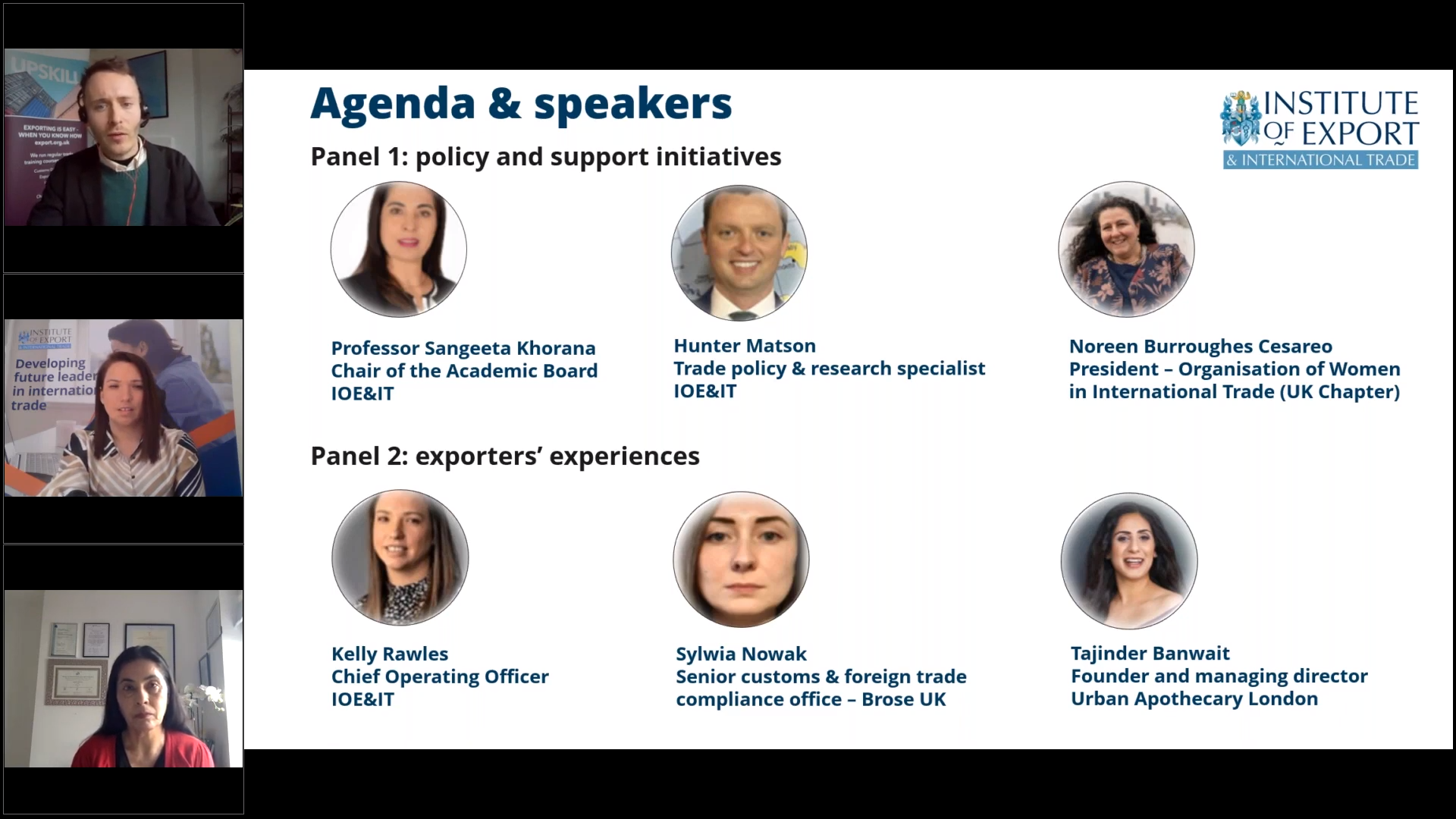
To celebrate International Women’s Day yesterday (8 March), the Institute of Export & International Trade (IOE&IT) ran a free webinar looking at what can be done to support more women to thrive in global trade.
The IOE&IT Daily Update here looks at some of the key takeaways from what was an enlightening and inspirational event.
Gender inequality remains rife
Professor Sangeeta Khorana, the chair of the IOE&IT academic board, said:
“Women represent 50% of the world population but if you look at how much they contribute to the economy, they contribute just around 37%. In the global workforce, just 39% of women are gainfully employed. This is telling us that there is a gender disparity.”
However, she added that this was an improvement compared to female representation in the workforce in the past.
Trade can help address this
Professor Khorana added that trade is a “great driver of growth that can ensure women can participate on equal grounds with men when it comes to economic opportunities.”
She cited research that shows that businesses operating in international trade employ more women, particularly in developing countries.
“Trade has the potential to address the gender inequality we see today. Secondly, trade creates better jobs for women.
“Trade can also help women move into the formal economy.”
She said that governments, international organisations like the WTO and World Bank, and the private sector are “increasingly incorporating a gender trade perspective into their activities”.
She said governments must “generate long-term gender inclusive growth programmes” which “address the constraints that women face today in international business and trade.”
But there are challenges in trade
Noreen Cesareo, the president of the UK chapter of the Organization of Women in International Trade (OWIT), agreed with Khorana, but said women working in trade continued to encounter challenges.
This includes a lack of visibility, insufficient access to digital portals, marketplaces and finance, and there not being enough signposting to relevant networks and information required to trade. She said:
“Even in established markets like the UK we still have challenges, but there is a lot of scope to move the dial.
“In the UK we need to upskill and train women entrepreneurs and ensure they have access to the funding, skills and tools they need to trade effectively.”
‘Pink tariffs’ need to be addressed
Sylwia Nowak, a senior customs & foreign trade compliance office at Brose Limited, said the issue of ‘pink tariffs’ – which are additional costs (high duties) imposed on products marketed to women, such as cosmetics and personal care products, that are not imposed on equivalent men’s goods – needed to be addressed.
“This could be achieved through the UK’s free trade agreements or by eliminating or reducing the duties on affected products in general,” she said.
She quoted analysis from the WTO, which said:
“Pink tariffs are hurting women consumers across the world and keeping women workers in developing countries from broader export opportunities and better jobs.”
The IOE&IT’s role
Kelly Rawles, the chief operating officer at the IOE&IT, said “driving quality is a key mission” for the organisation, as shown by its running yesterday’s webinar and its support for the International Trade Centre’s SheTrades initiative at the WTO Public Forum last year.
“Internally, we continue to ensure we have a good balance of male and female staff, with female members at the management and senior levels,” she added.
She said the IOE&IT continues to “champion both male and female traders” and to support them with the “challenges they are facing.”
Men also have a ‘crucial role’
Hunter Matson, a trade policy and research specialist, said men too have “crucial role”.
“Men have an obligation to speak up when we see injustice and inequality. Even in places like the UK and western Europe where we think we have gender parity, we truly don’t.
“We need to educate ourselves to the barriers women face because, as a man in trade, many of these barriers are invisible to me.
“One of the things men can do is proactively research and learn about this issue, reach out to their female colleagues and ask them about the barriers they face, so that they can help find the solutions to address these.”
He added that men and women can also reach out to lawmakers to ensure gender provisions in trade agreements are meaningful and legally binding.
‘Meet the challenges head on’
Tajinder Banwait, the founder and managing director of Queen’s Award winner Urban Apothecary London, gave three tips to her fellow women in trade:
“Expand your networks, find help with the IOE&IT or bodies specific to your sector, and meet the challenges head on.
“There’s going to be many challenges, but that’s just part of the journey.”
You watch the recording of the webinar on YouTube here.



